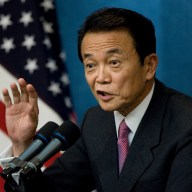TOKYO – Exxon Mobil Corp. is selling its Japanese refining and marketing business to partner TonenGeneral Sekiyu K.K. in a $3.9 billion deal that reflects a long-term decline in Japan’s demand for fuel and a global strategy to refocus on exploration.
TonenGeneral Sekiyu will buy 99 per cent of the shares of Exxon Mobil Yugen Kaisha, which refines and sells fuel and lubricants, the Japanese refiner said about the deal, announced Sunday. Exxon Mobil’s stake in TonenGeneral will drop to 22 per cent from 50 per cent.
Large oil and gas companies have been shedding refining operations in recent years and turning to oil exploration and production in the hope of bigger profits. Tighter rules for car and truck fuel efficiency are expected to weigh on growth in demand for fuel in developed countries for years to come.
Sherman Glass, president of ExxonMobil Refining, told a press conference Monday in Tokyo that it was a restructuring move amid a changing global energy market, but said the company remained “very committed” to its refining — or downstream — operations.d
“What we continue to do is try to restructure — in some cases invest, in some cases divest and in some cases restructure — to make it a strong group of operations in our downstream” business, Glass told reporters.
The companies plan to conclude the deal in June.
Exxon, the world’s largest publicly traded oil and gas company, has a “long-term strategy of moving away from refining, where the margins are wafer thin, and into exploration,” said Nicholas Smith, a strategist at CLSA Asia-Pacific Markets in Tokyo. “Refining is something that anybody can do. You can buy the technology off the shelf.”
TonenGeneral said the move would make it more flexible, efficient and competitive in a market where demand is declining as the population ages and shrinks.
“The Japanese market is getting tougher,” said Jun Mutoh, the company’s managing director. “The decision-making within the company will be more effective in the newly integrated production-distribution operation.”
TonenGeneral will continue to deliver products and services under the Esso, Mobil and General brands and continue to rely on Exxon’s technology and technological support in the refining and petrochemicals businesses.
Other major oil companies are making similar moves.
Marathon Oil spun off its refining operations last July. This summer ConocoPhillips also plans to split itself in two, separating its refining operations from its more profitable oil and gas exploration and production business. BP and Shell are selling refineries in the U.S. and Western Europe.
Exploring and producing oil and gas offers investors a chance for faster growth. Also, oil prices are high and are expected to remain so, which has helped producer profits and funded a boom in new exploration.
Glass also said Exxon would like to develop Japan as a market for natural gas, another key part of Exxon’s business, but said exporting it from the U.S. would be “problematic” and that shipping it from Australia or the Middle East would be more likely options.
He cited the company’s 2010 acquisition of XTO Energy for its expertise in shale gas and fracking, a drilling method that is used to free oil and gas from rock, as an example of investment in the business.
“We are taking advantage of their expertise to bring additional gas to the market in a number of places around the world,” he said. “We do believe that Japan is a promising market that we’d like to develop for LNG,” or liquefied natural gas.
















